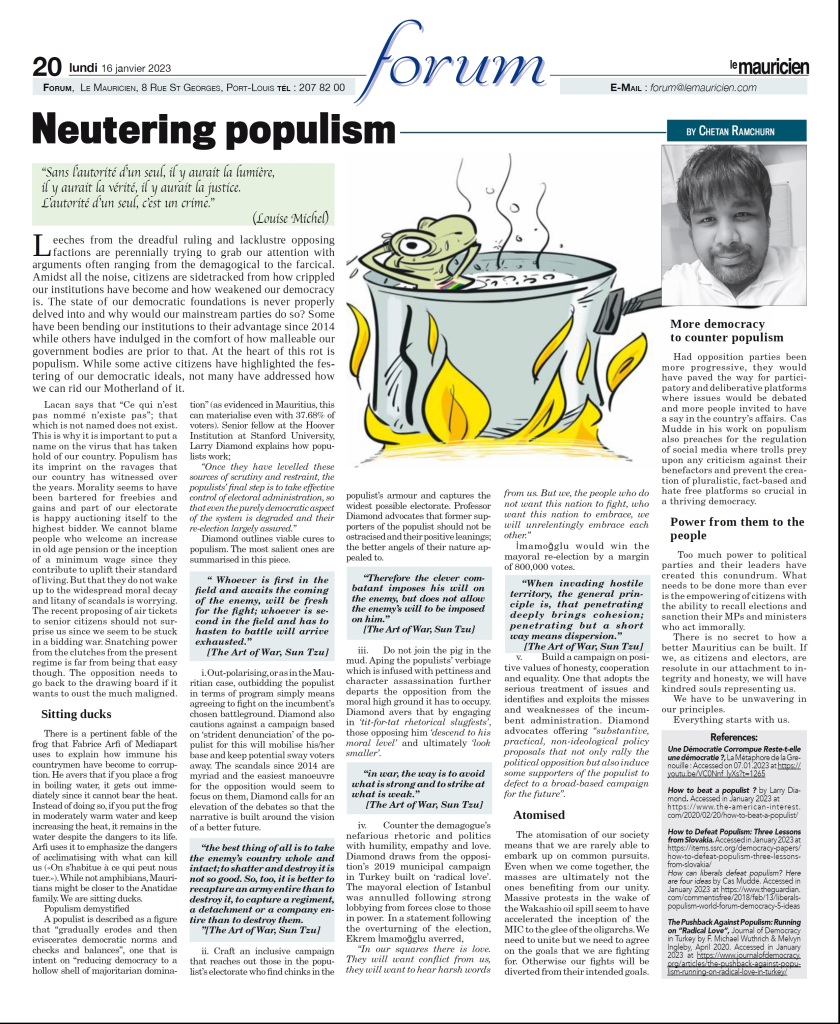“The opposition in our country is still relatively strong, but the opposition parties are weak”
Interview: Chetan Ramchurn
* ‘Barely a couple of months back MSM supporters thought that it would be a walkover win for them. This is no longer the case’
* ‘Rejection of the MSM does not automatically translate into votes for the Opposition parties. They will have to work harder…’
As Mauritius gears up for potential general elections, all eyes are on the upcoming Labour Day rallies, which will reveal the current political dynamics. Chetan Ramchurn, a seasoned observer of Mauritian politics, sheds light on the implications of the PMSD’s departure from the opposition alliance and discusses the strategies and obstacles faced by both the ruling and opposition parties. From addressing electoral fatigue to the need for new leadership, Chetan Ramchurn dissects the intricacies of Mauritius’ political landscape. As the nation approaches a pivotal moment, the interview also explores the factors that will influence the outcome of the elections.
Mauritius Times: This 1st of May holds particular significance as it appears that the Prime Minister may announce general elections sometime this year. The crowds at the Labour Day rallies will provide insight into the “rapport de forces” on the ground, but the assistance of activists and party sympathizers at the “reunions de mobilisation” of both alliances indicates substantial support for each. It’s shaping up to be a tough battle, isn’t it?
Chetan Ramchurn: Indeed, there seems to be significant hype around the Labour Day rallies. The general elections are on the horizon and while the remote control for the short timetable of events rests with the sitting PM. I say short for the present mandate will soon come to an end, and the obligation to organise by-elections within 240 days hovers above the MSM’s head. A defeat at the No.10 by-elections would verily disrupt their plans. Jugnauth will in all probability go for general elections sooner rather later.
This last first of May rally prior to the general elections also comes against the backdrop of a simmering political cauldron. The PMSD has left the opposition alliance, ending long months of tumultuous bed fellowship more with the MMM than the Mauritius Labour Party (MLP). This paves the way to serve the electorate an amended version of the 2014 remake; the MLP and the MMM join whatever is left of their forces once again with the trio of dissenters from the PMSD and in all likelihood a veneer of ‘difference’ or ‘leftism’ from fringe parties and their members.
Disappointingly, non-mainstream parties seem eager to auction their ideals even at the expense of losing their bearings in the finalisation of this pact. If they merely ape the thoughts of the main parties, where lies the difference? They have yet to get the narrative right. As Antoine de Saint-Exupéry would say: « Si tu diffères de moi, mon frère, loin de me léser, tu m’enrichis. »
The MSM watches. In the last decade, it has ‘transformed’ institutions into weapons that presently wait to strike its opponents should the need arise. It has campaigned consistently since it was elected in 2019. How could it not? 62% of the electorate voted against the governing alliance in the last elections which should remind us of the following: despite the billions spent distributing money to key segments, despite the many lackeys hyping it, more than 6 out of 10 of Mauritians did not deem the winning alliance as trustworthy. This should remind us of the following: the opposition in our country is still relatively strong, but the opposition parties are weak.
There are some days left before Labour day and we have to hope that they use this event to bolster what Prashant Kishor terms the 4 Ms: the Message, Messenger, Machine (referring to the party or parties involved), and Mechanics (the process of connecting the leader with the masses).
* The departure of the PMSD from the LP-MMM-PMSD alliance, for reasons not entirely clear to this day, may have weakened the “force de frappe” of that alliance. Winning could now be more challenging for Ramgoolam and Bérenger. Do you share this perspective?
The timing of the separation certainly raises questions on the intent of the PMSD. Bhadain claims that the 35-25 breakdown of tickets has been known for long. That the finer details of the deal were apparently not known to the PMSD surprises many. As leader of the opposition, Duval personified the rejection of the MSM and its many scandals and, overnight, he is mum about the billions allocated to drains and the clear project management issues.
To be honest, winning would have been challenging even with PMSD staying alongside the MLP and MMM. Their contribution to votes in the rural region is scant. What seemed clear to me since 2014 was that the MLP needed to introspect, reconnect with its base and grow organically. In business terms, it has pursued a merger and acquisition (M&M) strategy, once again embracing the 40+40 mantra. The electorate’s high rejection of the MSM does not imply automatic allegiance to the mainstream opposition parties. The latter will have to work harder.
There seems to be renewed energy within opposition ranks since the PMSD’s departure. Now no longer in an alliance with the MLP and the MMM, the PMSD will have no qualms in spreading the narrative that Ramgoolam is being manipulated by Berenger. The MLP and the MMM must counteract this perception.
* Apart from what is widely suspected to be the ruling alliance’s access to a significant war chest, the MSM has also shown a willingness to employ any means necessary to achieve its objectives. Do you believe the tide is turning against them this time?
Nothing will be off limits once again. Nearly a decade of power marked by glaring mismanagement and widespread corruption will certainly impact the MSM’s electoral prospects. But rejection of the MSM however does not automatically translate into votes for the mainstream opposition parties. They will have to work harder and not succumb to hubris like in 2014.
* Just like in 2014, the need for regime change has once again brought the Labour Party and the MMM together. However, to win the electorate’s confidence, they must also demonstrate that their partnership is going to be workable should they win the next elections. Do you believe there are valid concerns about this?
The situation in 2014 was different.
The ill-fated second republic… that constitutional imbroglio caused a backlash as well as the equal repartition of tickets. In 2024, nothing of the sort is on the agenda. Still, creating an alliance to overthrow the present regime means nothing if we do not know, to paraphrase Slavoj Zizek, what happens the morning after.
Let us hope that those advocating for change are aware of this. If not, we might be facing another Illovo or smart city scheme in the coming years.
* In addition to agreeing on key posts and electoral tickets, is it crucial for there to be consensus within the Opposition alliance on major economic policies? This question arises considering the minimal ideological differences between the parties today. What do you think?
The mainstream opposition hosts some of the architects of the first Illovo deal and the Integrated Resort Scheme as well as proponents of the flat tax regime (that enduringly crippling measure) and the Real Estate Scheme. The uninterrupted pandering to the oligarchy has to be stopped.
In 2023, the Fabian society gave its list of priorities for a Labour government. These included measures to protect against inequality in the early years, affordable housing and raising living standards amongst others. A common ground on economic direction would be the first step.
* When considering a common minimum programme for the LP-MMM alliance, governance of the country emerges as a key concern. What specific proposals do you have in mind that could signify a departure from what we have been subjected to over the last couple of years?
Greater opportunities for those at the lower rungs of the economic ladder have to be created. Assistance to entrepreneurs through a monthly stipend in the first 18 months would help them navigate through the turpitudes of the business world as would free training to them.
A special attention to the ageing population would be most welcome. Merely giving senior citizens money neither alleviates their loneliness nor ensures their safety. A more caring approach to them would include better access to medical facilities and a rethinking of our infrastructure.
Bolstering democracy through recall elections is a priority. So many sitting MPs have been found inept. Ensuring that these no longer remain in office would instill greater faith in our system.

















You must be logged in to post a comment.